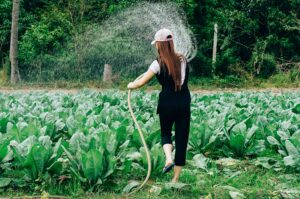Why is water quality so important for crop, livestock production… and end-consumers?
 The quality of water plays an important role in our food security. Agricultural water is used to grow fresh produce, which includes irrigation, pesticide and fertilizer applications, crop cooling and frost control, and sustain livestock. Irrigated agriculture represents 20 percent of the total cultivated land and contributes 40 percent of the total food produced worldwide. Just in the U.S. it is over 330 million acres of land that is used for agricultural purposes, among which growing fruits, vegetables and raising livestock. Think about it, this is basically the main part of our human diet!
The quality of water plays an important role in our food security. Agricultural water is used to grow fresh produce, which includes irrigation, pesticide and fertilizer applications, crop cooling and frost control, and sustain livestock. Irrigated agriculture represents 20 percent of the total cultivated land and contributes 40 percent of the total food produced worldwide. Just in the U.S. it is over 330 million acres of land that is used for agricultural purposes, among which growing fruits, vegetables and raising livestock. Think about it, this is basically the main part of our human diet!
Water quality and its impact on agriculture and various operations in food industries are often underestimated. Contamination can happen through a variety of ways – poor planning of industrial sites, animal farms, barnyards and feedlots – and can potentially spread bacteria, viruses, and parasites to crops and animals leading to contaminated food products which can cause illness when eaten by the end consumer.
New focus on Florida’s Agriculture through well water comprehensive analysis
While the State government and other agencies have been monitoring water quality in Florida, our study – conducted in partnership with Florida International University – brings a new focus to the quality of water used in our state’s Agricultural Sector.
Groundwater from wells is the main source of agricultural water (aside surface water and rainwater) and is generally considered one of the safest sources of water. This is why we chose to focus on well water. “In order to have a comprehensive study on well water which is the main source of irrigation, animal feed and also in many cases drinking water for humans, we wanted to conduct a comprehensive research in order to find out the properties of the water and thoroughly assess its quality”, comments Amir Khoddamzadeh, Ph.D. Undergraduate Program Director, Department of Earth and Environment, FIU.
Over 40 farms spread throughout Florida were selected, representing both livestock and crop farms including chicken, beef cattle, dairy cattle, swine and horse farms under animal agriculture and nurseries, ornamental gardens, fruit orchards and vegetable farms under crop agriculture. These commodities combined represent more than 85% of Florida’s Agriculture.
Bishnu Pandey, Water Analyst at Weo LLC, is in charge of the water sampling process, in compliance with EPA’s guidelines. “Our comprehensive water quality analysis was carried out with an emphasis on some of the major contaminants, including heavy metals, pesticides, volatile organic compounds, coliform bacteria and nutrients including nitrogen and phosphorus”, he explains.
“Among the contaminants that we could find, E.Coli and heavy metals are the most harmful and can cause severe illness in humans and animals. adds Daniel Tucker, Research Assistant at FIU. “Through our study’s results, we hope to benefit statewide communities and encourage educated decisions in the use of well water for drinking, in irrigation of crops and for animal farming throughout the state”.
